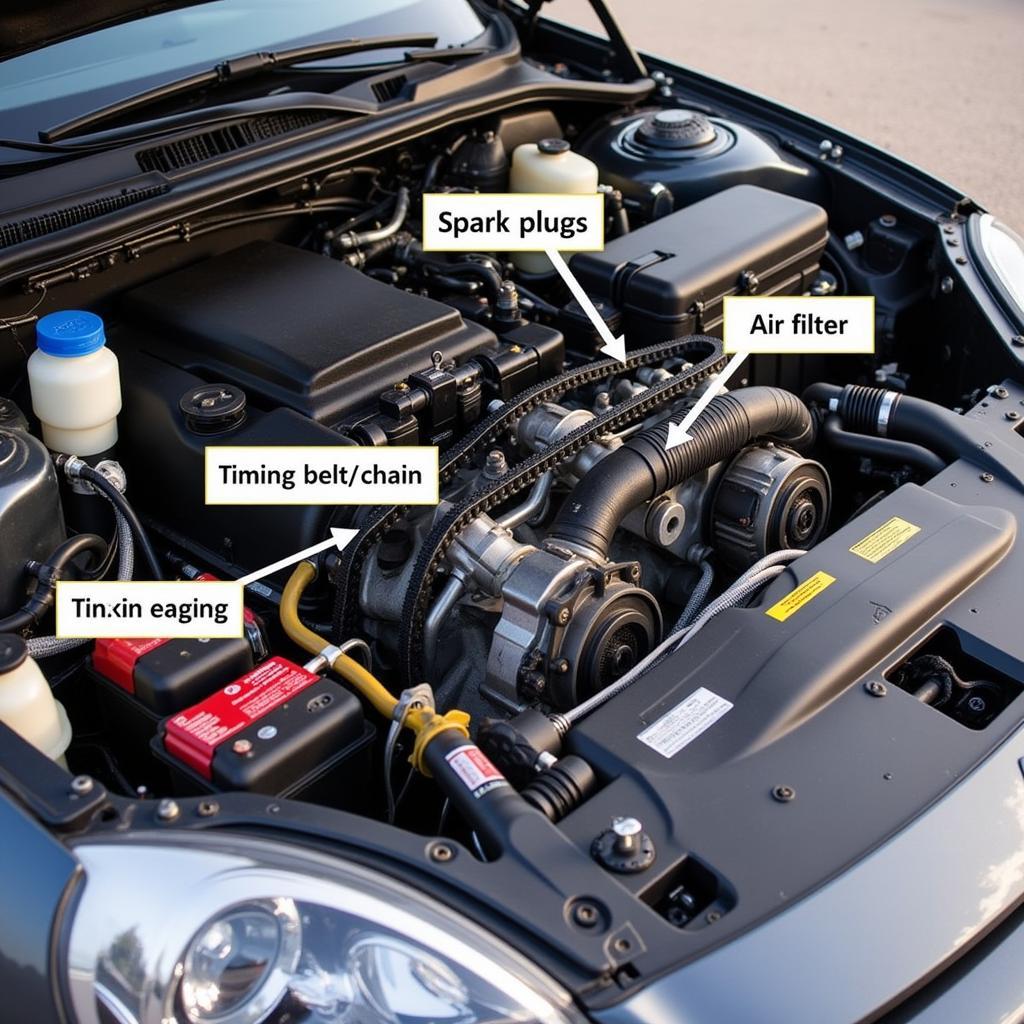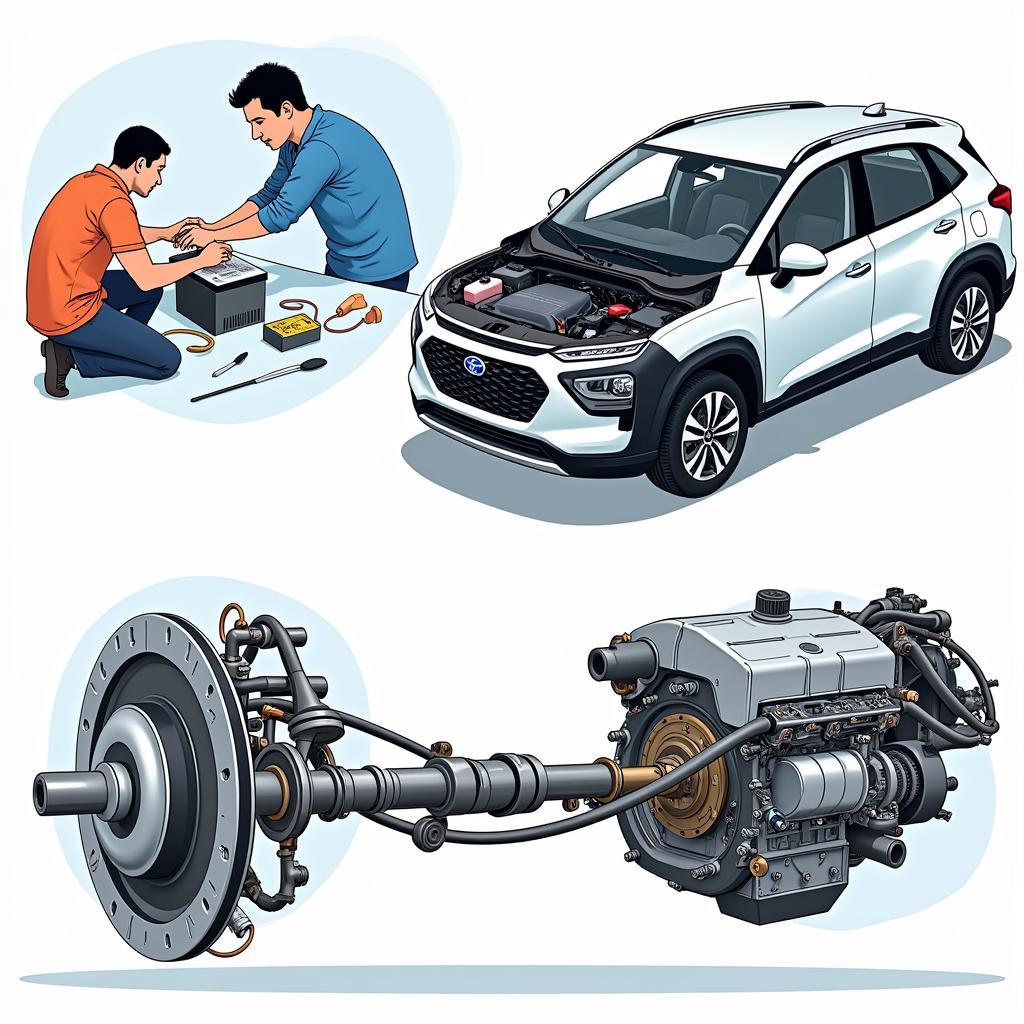Understanding your Annual Car Maintenance Spending can be a bit of a mystery. It’s not always clear what you should be budgeting for, and sometimes unexpected repairs pop up. This article will guide you through the ins and outs of annual car maintenance costs, helping you anticipate expenses and make informed decisions about your vehicle.
What Factors Influence Annual Car Maintenance Costs?
A few key factors play a major role in determining how much you’ll spend on car maintenance each year. These factors include:
- Vehicle Age & Mileage: Older cars, especially those with high mileage, generally require more frequent and extensive maintenance.
- Vehicle Make & Model: Some car brands are known for having higher maintenance costs than others. For example, car brands with the highest maintenance cost.
- Driving Habits: If you drive frequently in harsh conditions or engage in aggressive driving, your car will experience wear and tear at a faster rate, leading to more maintenance needs.
- Location & Climate: Extreme weather conditions, such as hot summers or cold winters, can also impact your car’s maintenance requirements.
- Maintenance Schedule: Following your car’s recommended maintenance schedule can help you catch potential problems early and prevent costly repairs later on.
Typical Car Maintenance Expenses
Here are some common annual car maintenance expenses you should budget for:
Routine Maintenance
- Oil Changes: One of the most frequent maintenance needs, typically required every 3,000-5,000 miles.
- Tire Rotations & Inspections: Rotating your tires helps ensure even wear, while regular inspections can identify potential problems early.
- Air Filter Replacement: A clean air filter helps improve engine performance and fuel efficiency.
- Fluid Checks & Top-offs: Checking and topping off fluids like coolant, brake fluid, and windshield washer fluid is crucial for safe and optimal performance.
- Battery Inspection: Checking your battery’s health and ensuring it’s properly charged can prevent costly replacements down the road.
Scheduled Services
- Spark Plug Replacement: Spark plugs generally need replacement every 30,000-100,000 miles, depending on the type and your driving habits.
- Brake Pad & Rotor Replacement: Brake pads and rotors wear down over time, and need to be replaced every 20,000-40,000 miles.
- Timing Belt/Chain Replacement: Some cars require timing belt or chain replacements at specific intervals, typically around 60,000-100,000 miles.
 Car engine components
Car engine components
Tips for Reducing Your Annual Car Maintenance Spending
While some car maintenance costs are unavoidable, there are several ways to minimize your annual expenses:
- Follow Your Maintenance Schedule: Sticking to your car’s recommended maintenance schedule can help prevent costly repairs by catching problems early.
- Choose Quality Parts: Using high-quality parts during repairs can help ensure longevity and minimize the need for future replacements.
- Shop Around for Prices: Don’t be afraid to get multiple quotes for repairs from different mechanics or auto parts stores.
- DIY Maintenance: For simple maintenance tasks like oil changes, air filter replacement, or tire pressure checks, you can save money by doing them yourself. However, if you lack experience, it’s best to leave complex repairs to the professionals.
- Consider Extended Warranties: Depending on your vehicle, an extended warranty could help cover costly repairs beyond the manufacturer’s warranty.
What About Hybrid or Electric Vehicles?
While hybrid and electric vehicles often have fewer moving parts, they still require regular maintenance. However, some maintenance costs may be lower compared to traditional gasoline-powered vehicles. For example, are hybrid cars high maintenance?
 Hybrid car maintenance
Hybrid car maintenance
Here’s an expert’s opinion:
“Hybrids and electric vehicles do require less maintenance compared to traditional gasoline cars, but it’s crucial to understand that their maintenance needs can differ. For example, they may require specific components to be replaced, like battery packs. It’s important to consult the owner’s manual and follow recommended maintenance schedules,” says John Doe, a certified automotive technician with over 15 years of experience.
Common Questions About Annual Car Maintenance Spending
What’s a good annual car maintenance budget?
A good rule of thumb is to budget about 1% of your car’s value for annual maintenance. However, this can vary widely depending on your vehicle’s age, make, and model.
How do I find a reliable mechanic?
Recommendations from friends and family are a good starting point. You can also research mechanics online and check their ratings and reviews.
When should I replace my car?
There’s no one-size-fits-all answer to this question. However, if your car’s maintenance costs are becoming excessive and repairs are starting to pile up, it might be time to consider a newer vehicle.
For personalized advice and assistance with your annual car maintenance needs, contact us at AutoTipPro:
Phone: +1 (641) 206-8880
Address: 500 N St Mary’s St, San Antonio, TX 78205, United States
Understanding your annual car maintenance spending can help you stay on top of your vehicle’s needs and avoid unexpected expenses. By following a regular maintenance schedule, choosing quality parts, and being proactive, you can keep your car running smoothly and efficiently for years to come.




Leave a Reply